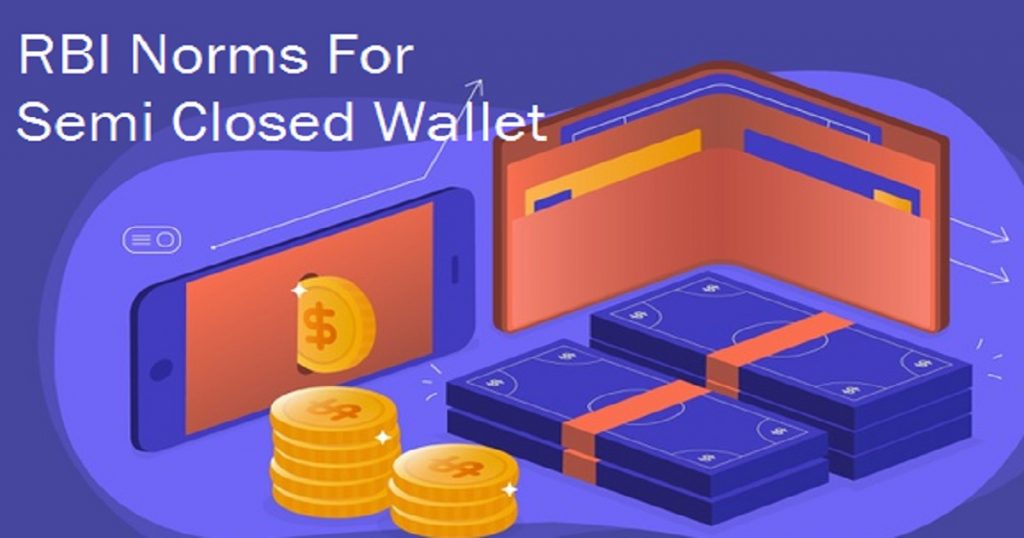What are the RBI Norms for Semi Closed Wallet?

Gonica Verma | Updated: Jul 29, 2019 | Category: Prepaid Wallet, RBI Advisory
In India, Semi closed wallets like PayTM, Mobikwik; Phone Pay, etc. have gained massive importance in the lives of people. Nowadays, people prefer e-wallets or online modes for their transactions and try to avoid cash transactions. Many entities want to operate as the Semi closed payment instrument issuers in India to provide facilities to their customers for purchasing goods and services, fund transfer, etc. To know more about PPI’s and government norms related to semi closed wallet, let’s proceed further;
Table of Contents
What is Semi Closed wallet?
A semi-closed wallet is a wallet used for purchasing goods and services and other remittance facilities for clearly identified merchant location or establishment. The users of semi-closed wallet can also transfer their virtual fund to other users as well.
Thus, the level of security in these wallets is very high and can allow uninterrupted and fast transactions to the merchants as well as to the bank accounts. The user needs to link the KYC details with the e-wallet to make transactions more than Rs.10k. The semi-closed wallet holders are not allowed to withdraw their cash or the balance of their Semi closed wallet. The users can only use that cash for any purchase or fund transfer to another user or the bank account.
In India, PayTM, Mobikwik, PayU, etc. are semi-closed wallets.
What are the norms of RBI for the Semi Closed Wallet?
To regulate semi closed wallets in India, Reserve Bank of India has provided specific directions and regulations for the issuance and functioning of Prepaid Payment Instruments.
PPIs (Prepaid Payment Instruments) are the instruments that help in facilitating the purchase of goods and services, financial services, etc. against the value/amount stored in such an instrument. In India, the PPIs are classified into three different categories:
- Open System PPIs
- Closed System PPIs
- Semi-Closed System PPIs
Semi Closed wallets are considered under the third category of PPI i.e., Semi Closed System PPI.
Therefore, for the operations of Semi closed wallets in India, the entity must obtain the license from RBI under the Payment and Settlement Systems Act, 2007.
The various norms for the issuance of a license for the operations of Semi Closed wallets by Reserve Bank of India are as follows:
Eligibility Criteria for obtaining Semi Closed Wallet license
- Banks must fulfil the eligibility criteria as stipulated by the Regulatory department of Reserve Bank of India.
- NBFCs authorized by RBI.
- Banks permitted for conducting mobile banking transactions by Reserve Bank of India.
- Non-banks that fulfil the adequate capital requirement can obtain this license only after the authorization or approval from RBI.
Requirements to be fulfilled for obtaining Semi Closed Wallet license
- RBI shall notify the minimum capital requirement for banks and NBFCs (authorized by RBI) on time to time basis.
- All the non-banking entities who want to seek approval from RBI for operating as Semi closed instrument issuers should have a minimum net worth of Rs.500 lacs or 5 crs as per last Balance Sheet.
- In case the entity is newly incorporated or not even completed one year of its incorporation, then the Certificate from CA of the company duly signed and sealed along with provisional Balance Sheet should be submitted to represent the current net worth of the company.
- Non-banking entities incorporated in India or listed under Companies Act, 1956 or 2013.
- The Memorandum of Association of any non-banking entity must specify its operating activity as Prepaid Payments Instruments issuer.
- Indian incorporated companies which satisfy the capital requirements prescribed under policy guidelines of FDI can also apply for this license.
Safeguards by RBI for Semi closed wallet
- RBI has introduced various safeguards such as KYC, AML, or CFT for reducing any risk associated with non-money and; and introduced necessary provisions to support the guidelines of the compliance.
- The PPI’s maximum value shall not exceed Rs. 50000.
- Only one card issued to the same person, and there is no requirement of KYC if Semi Closed Payment Instrument issued up to Rs.1000.
- Semi Closed Prepaid Payment instrument can be issued after KYC verification if the value exceeds Rs.5000.
- Those Semi Closed Payment Instruments which only permit the transaction for the electricity bill, utility bill, water bill or other such services up to Rs.10000.
- These instrument issuers do not need KYC[1], but they have to ensure that these facilities are acceptable at those institutions that maintain the record of users for further inspection by RBI.
- All the PPI issuers shall maintain the infrastructure of data security for the detection and prevention of fraud.
- Entities that are issuing PPIs facilities can also file STR (Suspicious Transaction Report) to FIU (Financial Intelligence Unit)-India if in case any suspicious transaction found.
Banks and Non-banks PPI issuers
PPI issued by both banks as well by non-banking entities.
Prepaid payment instruments in case of Semi closed wallet up to Rs.10k can be issued by accepting these following details only:
- Mobile Number verification by generating OTP (One Time Password),
- Self-declaration of UIN (Unique Identification Number) and name by any official document defined under Rule D of PML Rules, 2005.
- The amount of PPI cannot exceed Rs.10k in a month and Rs. 1lakh in the whole financial year.
- In this case, the PPIs are used for purchasing goods and services, not for any bank transfer or PPI transfer to the same insurer.
- If the PPI holder wants to close the PPI account, then the outstanding balance can be transferred to the bank account of the holder only after KYC verification.
Prepaid payment instruments in case of Semi closed wallet up to Rs.100k can be issued after KYC verification of the PPI holder. The holder will have to keep this in mind that the outstanding amount shall not exceed Rs. 100 lacs at any point of time.
Validity of PPI
- In the case of Semi closed wallet, the validity of PPI is six months from the date of issuance to its holder.
- The holder of the PPI can redeem their outstanding amount to their respective banks within the date of expiry or discontinuance by order of RBI. But the holder cannot exceed the PPI’s redemption value than its face value.
The mechanism for Redressing Customer Grievances
All the entities issuing PPI to users must define all the terms, conditions, and usage in clear terms at the time of issuance.
The entities should build an effective mechanism to handle the complaints of the customers.
The entities should avail the following facilities to its customers:
- Customer helpline or toll-free number.
- Validity
- Terms and conditions brochure
- The URL of the website
- Charges information
Conclusion
In this article, we’ve discussed various norms of semi closed wallets or PPI’s in India. The Government of India provides all security for conducting transactions through Semi closed wallets. It has also introduced several compliance to be fulfilled for reducing corrupting and detecting fraud transactions.
Every individual should prefer digital transactions rather than cash transactions for detecting fraud in transactions because they have proof of every purchase.
Also, Read: What is the Semi-Closed Wallet License in India














